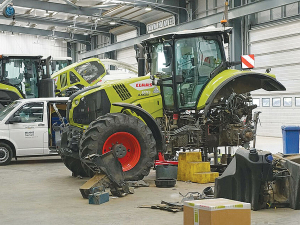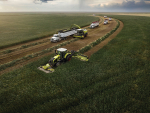Over the last halfdecade, digital technology has appeared to be the “must-have” for tractor and machinery companies, who believe that bringing IT to tractors and farming will offer its customers huge benefits.
Their diverging directions has led to a myriad array of systems and applications that are often useful in bringing efficiencies, while also engendering brand loyalty, but often doing little to simplify the already complex business of farming.
Harvesting and tractor manufacturer Claas has come to appreciate that the general mix of competing products, in some cases, might hamper, rather than encourage adoption of digital technology, so in response, has developed Claas Connect.
The German-headquartered company describes this as a single, cloud-based platform that brings together the full range of digital applications, from yield mapping to machine servicing and even digital licence expiry notification.
Although not entirely new, the latest revamp and upgrades are significant in further embracing all the facets of the farming operation which involve machinery. The company explains that the focus was to develop a common platform linking all relevant portals with a simple, userfriendly interface which provides access to all areas of information. To do this, Claas has brought together the machine management and fleet management aspects of farm mechanisation and now considers them as a whole.
To further enhance the digital journey, as well as access for farmers and dealers, there is also the opportunity for third parties to access certain parts of the data that might be desirable or necessary. This would include agronomists, who will be able to take geodata, such as yield and soil maps, to recommend fertiliser applications based on this data, helping to bridge the yawning gap between collecting field data and applying the information it contains to input recommendations.
On the machine management side, it appears that new tractors and harvesters will be supplied with a five-year Machine Connect licence that enables automatic updates and service interval alerts, as well as recording any work undertaken. The system also allows other brands to be integrated, allowing an overview of position, fuel levels and machine status to be displayed on the same screen.
This cross compliance extends to meta data for precision farming, such as field boundaries, though the use of the SHAPE or ISO-XML file formats. Looking ahead, Claas says further upgrades to its software will allow greater data sharing beyond the single individual Claas ID, simplifying task planning, implementation and documentation.











